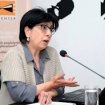Possibilities and Understanding of the Karabakh Conflict Resolution 25 Years after the Ceasefire : Page 2 of 10
to achieve, because they needed negotiations as a process that was a solution to many of their problems. And we must pay tribute to the mediators who have managed to combine fragments from completely different paradigms of the parties’ understandingof the essence of the conflict and their visions of its resolution in different proposal packages.
In essence, the interpretation of the conflict between the Azerbaijani and Armenian parties remains to belong to different systems,by definition.
This is a territorial conflictfor the Azerbaijani party, therefore for the resolution of this conflict Armenia (!!) must “ensure territorial integrity within the international borders of Azerbaijan, ensure the return of internally displaced persons to their homes, and promote the peaceful coexistence of the Azerbaijani and Armenian communities of the Nagorno Karabakh region of Azerbaijan.” This is a quote from the statement of the Ministry of Foreign Affairs of Azerbaijan, regarding the 25th anniversary of the ceasefire agreement.
In the perspective of the Armenian party, the conflict is legal, proceeding from the realization of Artsakh people’sright to self-determination, therefore “the conflict resolution scenario should be acceptable to all three parties - the peoples of Armenia, Artsakh and Azerbaijan” and “... substantive negotiations and results are possible only if Artsakh is involved in a process that will ultimately determine its status and provide guarantees for the safety of the people living there. We are convinced that the trilateral agreement is a real basis on which long-term peace and cooperation can be built.” These are quotes from the statement by the Prime Minister of Armenia N. Pashinyan,which was made in relation to the same date mentioned above.
Grazvydas Jasutis - The position of Azerbaijan has not changed, and the political elite in Azerbaijan has not been changed or "updated." The Aliyevdynasty hasclearly formulated their goals and, frankly, they follow their line without changes and compromises. I would say that they make some compromise in terms of the process, but not in terms of results. Also, I would not say that Azerbaijan is blackmailing, although some actions and statements may hint at it.
Alexander Iskandaryan - In principle, there is more or less of a consensus in the society and the elites regardingthe basic foundations of the settlement in Armenia. This consensus is as follows: 1) Karabakh cannot be in a situation of vertical relations with Baku. 2) Security guarantees are required for any settlement. Now these are the army and the configuration of the borders. In order to sacrifice them, you need to replace them with at least something equally solid. No "paper" can be a solid guarantee by definition, due to the lack of basic trust.
Accordingly, the settlement is an extremely distant perspective, to say the least.
The Azerbaijani perspective, at least publicly, is a return to the situation before 1988, i.e.Karabakh is an autonomy within Azerbaijan. Since Azerbaijan understands the Armenian position, they also understand the illusiveness of any consensus on such a basis, hence a consensus-based settlement is seen as a purely hypothetical perspective.
Yes, over the past two years, after April 2016, the position
Pages
- « первая
- ‹ предыдущая
- 1
- 2
- 3
- 4
- 5
- 6
- 7
- 8
- 9
- 10
- следующая ›
- последняя »







 +37410 563363
+37410 563363
 ул. Бузанда 1/3, 8-й этаж, Ереван, Армения
ул. Бузанда 1/3, 8-й этаж, Ереван, Армения